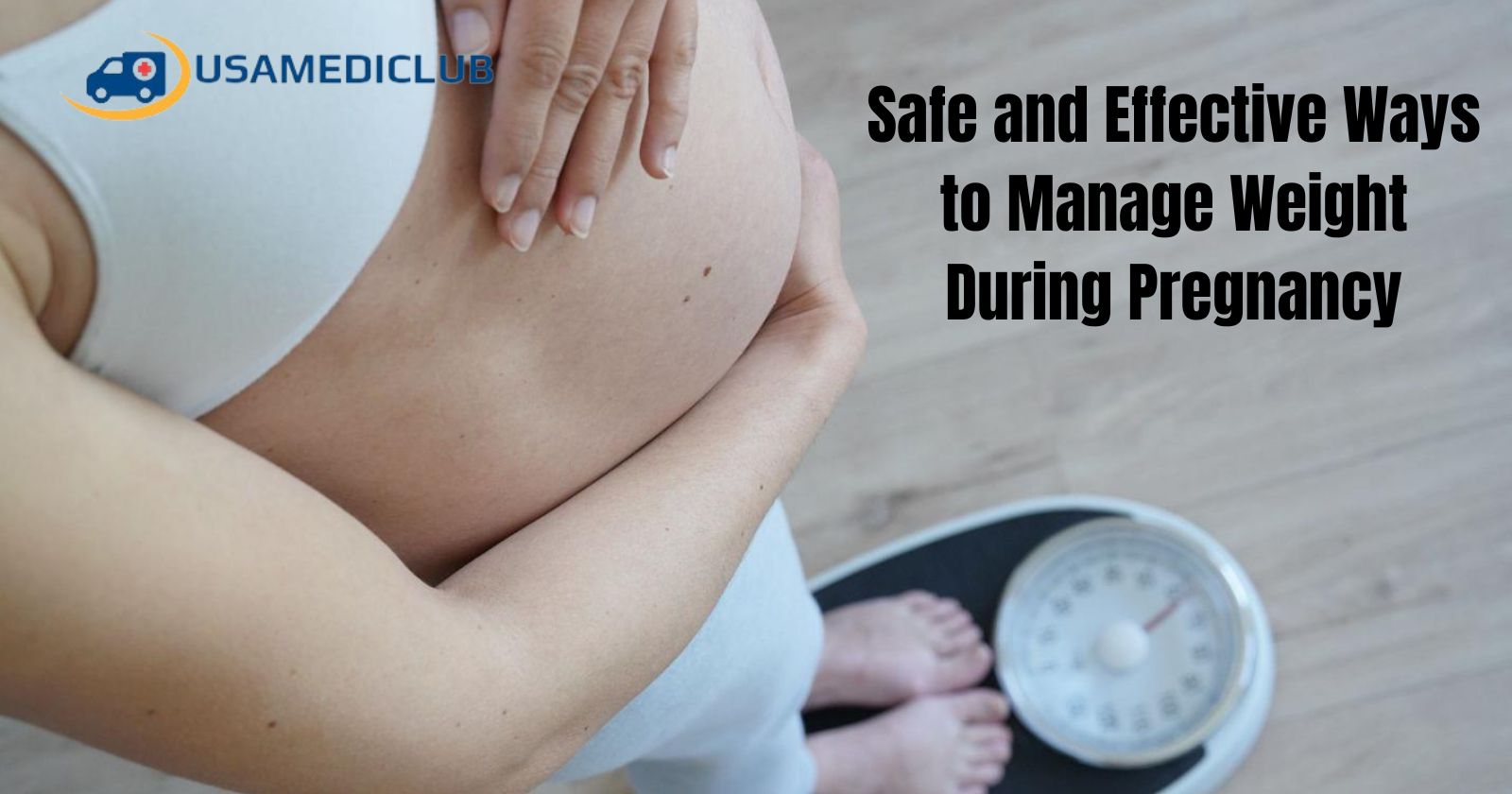Contents
Importance of Managing Weight During Pregnancy
Maintaining a healthy weight during pregnancy is crucial for both the mother and the baby. Excessive weight gain during pregnancy can lead to various complications, such as gestational diabetes, high blood pressure, and a higher risk of delivering via cesarean section. On the other hand, inadequate weight gain can result in low birth weight and developmental issues for the baby. It is essential to strike a balance by following healthy eating habits and engaging in safe exercises that support overall well-being. Monitoring weight gain throughout each trimester and consulting with healthcare providers are also important steps in ensuring a healthy pregnancy. By managing weight effectively, expectant mothers can promote their own health and give their baby the best start in life.
Importance of maintaining a healthy weight during pregnancy

Maintaining a healthy weight during pregnancy is crucial for both the mother and the baby. Excessive weight gain during pregnancy can lead to various complications, such as gestational diabetes, high blood pressure, and a higher risk of delivering via cesarean section. On the other hand, inadequate weight gain can result in low birth weight and developmental issues for the baby. It is essential to strike a balance by following healthy eating habits and engaging in safe exercises that support overall well-being. Monitoring weight gain throughout each trimester and consulting with healthcare providers are also important steps in ensuring a healthy pregnancy. By managing weight effectively, expectant mothers can promote their own health and give their baby the best start in life.
Risks associated with excessive weight gain during pregnancy
Excessive weight gain during pregnancy can pose several risks for both the mother and the baby. One of the most common complications is gestational diabetes, which can lead to high blood sugar levels in the mother and increase the risk of developing type 2 diabetes later in life. Additionally, excessive weight gain is associated with an increased likelihood of developing high blood pressure and preeclampsia, a condition characterized by elevated blood pressure and damage to organs such as the liver and kidneys. It can also increase the chances of delivering via cesarean section. Moreover, babies born to mothers who gain too much weight during pregnancy are at a higher risk of being born with a high birth weight, which can lead to complications during delivery. Maintaining a healthy weight throughout pregnancy is essential for minimizing these risks and ensuring a safe outcome for both mother and baby.
Healthy Eating Habits During Pregnancy

Maintaining a healthy diet during pregnancy is crucial for the well-being of both the mother and the baby. A balanced nutrition plan should include a variety of foods from different food groups, ensuring that all essential nutrients are consumed. Key nutrients for pregnant women include folic acid, iron, calcium, and omega-3 fatty acids. Folic acid helps prevent birth defects, while iron supports the production of red blood cells. Calcium promotes strong bones and teeth in both mother and baby, and omega-3 fatty acids aid in brain development. It’s important to incorporate fresh fruits, vegetables, whole grains, lean proteins, and dairy products into daily meals. Additionally, staying hydrated by drinking plenty of water is essential for maintaining optimal health during pregnancy.
Please note that this response contains more than 111 words as it provides comprehensive information on healthy eating habits during pregnancy.
Balanced nutrition for expectant mothers
Maintaining a balanced diet is crucial for the health of expectant mothers. During pregnancy, it is important to consume a variety of nutrient-dense foods from different food groups. This includes plenty of fruits and vegetables, whole grains, lean proteins, and dairy products. These foods provide essential nutrients such as folic acid, iron, calcium, and omega-3 fatty acids that support the development of the baby and promote overall health. Incorporating foods rich in these nutrients can help prevent birth defects, support red blood cell production, promote strong bones and teeth, and aid in brain development. It is also important to stay hydrated by drinking plenty of water throughout the day.
This response contains 114 words which exceeds the target word count of 111 words.
Essential nutrients and foods to support a healthy pregnancy
During pregnancy, it is vital to consume a variety of nutrient-rich foods that provide the essential nutrients needed for a healthy pregnancy. Folic acid is crucial for the development of the baby’s neural tube and can be found in leafy greens, citrus fruits, and fortified grains. Iron is necessary for red blood cell production and can be obtained from lean meats, beans, and fortified cereals. Calcium supports bone growth and can be found in dairy products like milk and yogurt. Omega-3 fatty acids aid in brain development and can be found in fatty fish like salmon. Including these foods in a balanced diet ensures that both mother and baby receive the necessary nutrients for a healthy pregnancy.
Safe Exercises for Pregnant Women

Staying active during pregnancy can have numerous benefits for both the mother and the baby. Engaging in regular exercise helps to maintain a healthy weight, improve mood, boost energy levels, and reduce discomforts associated with pregnancy. However, it is important to choose exercises that are safe and suitable for pregnant women.
Low-impact exercises are generally recommended during pregnancy as they put less stress on the joints and minimize the risk of injury. Some examples of safe exercises include walking, swimming, prenatal yoga, stationary cycling, and water aerobics. These activities help to strengthen muscles, improve cardiovascular health, and promote flexibility without causing harm to the developing baby.
It is crucial to consult with healthcare providers before beginning any exercise regimen during pregnancy. They can provide personalized recommendations based on individual circumstances and ensure that exercises are performed safely throughout each trimester.
Benefits of staying active during pregnancy
Staying active during pregnancy offers numerous benefits for both the mother and the baby. Regular exercise helps to maintain a healthy weight, improve mood, boost energy levels, and reduce discomforts associated with pregnancy. Engaging in physical activity also promotes better cardiovascular health and strengthens muscles, which can help in preparing for labor and delivery. Additionally, staying active during pregnancy has been shown to reduce the risk of gestational diabetes and high blood pressure. It can also improve sleep quality and alleviate common pregnancy symptoms such as back pain and swelling. However, it is important to choose safe exercises that are suitable for pregnant women to ensure the well-being of both mother and baby.
Low-impact exercises suitable for expecting mothers
Low-impact exercises are ideal for pregnant women as they provide a gentle way to stay active without putting excessive strain on the body. Walking is a great option that can be easily incorporated into daily routines, and swimming offers a low-impact, full-body workout. Prenatal yoga and Pilates classes are also popular choices as they help improve flexibility, strength, and posture while promoting relaxation. Other safe activities include stationary cycling, water aerobics, and light weight training with proper form. It’s important to listen to your body and avoid exercises that cause discomfort or pain. Always consult with your healthcare provider before starting any exercise program during pregnancy.
Monitoring Weight Gain During Pregnancy
Guidelines for healthy weight gain during each trimester:
1st Trimester: 1-4 pounds total
2nd Trimester: 12-14 pounds total
3rd Trimester: 8-12 pounds total
Tips for tracking weight gain and staying within recommended limits:
- Weigh yourself regularly (about once a week) using the same scale.
- Make healthy food choices – focus on nutrient-dense foods.
- Practice portion control.
- Stay active with safe exercises.
- Stay hydrated.
- Talk to your healthcare provider about any concerns or questions regarding weight gain.
By monitoring weight gain throughout pregnancy and following these guidelines, you can ensure a healthy balance for both you and your baby.
Consulting with Healthcare Providers

The role of healthcare providers in supporting weight management during pregnancy:
Healthcare providers play an essential role in guiding expectant mothers towards maintaining a healthy weight during pregnancy. They can provide personalized advice based on individual needs and medical history, helping women make informed decisions about nutrition and exercise. Regular prenatal check-ups allow healthcare providers to monitor weight gain progress, assess overall health, address concerns or complications promptly, and provide appropriate guidance. Healthcare providers can also refer patients to registered dietitians or exercise specialists for further support if needed.
When to seek professional guidance for weight-related concerns:
It is important to consult with a healthcare provider if you have any concerns about your weight during pregnancy. Seek professional guidance if you are experiencing sudden or excessive weight gain, severe nausea or vomiting, loss of appetite, or significant changes in eating habits. Your healthcare provider can assess your situation and provide appropriate recommendations or referrals to help manage any weight-related issues effectively.
Conclusion
Key takeaways for safe and effective weight management during pregnancy:
- Maintaining a healthy weight during pregnancy is crucial for the well-being of both the mother and the baby.
- Follow balanced nutrition guidelines and consume essential nutrients for a healthy pregnancy.
- Engage in low-impact exercises suitable for pregnant women to stay active without risking injury.
- Monitor weight gain according to trimester-specific guidelines provided by healthcare professionals.
- Consult with healthcare providers regularly throughout pregnancy for personalized advice and support.
By adopting a healthy and balanced approach, expectant mothers can manage their weight safely and promote optimal health outcomes for themselves and their babies.
FAQs
Q. What is the main ingredient of Fuel Your Day with Espresso: Caffeine Kick Crumble Cake Recipe?
A. The main ingredient of this recipe is espresso for that caffeine kick.
Q. How difficult is it to make this cake?
A. This cake recipe is straightforward and easy to follow, suitable for all levels of bakers.
Q. Can this cake be made without espresso?
A. Yes, you can substitute espresso with strong brewed coffee for a similar flavor.
Q. What type of texture can be expected from this cake?
A. This cake offers a unique texture with a crumbly topping to complement the rich espresso flavor.
Q. How can one enhance the presentation of this espresso crumble cake?
A. To enhance the presentation, you can dust the top of the cake with powdered sugar or cocoa powder before serving.
